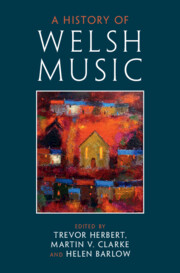Book contents
- A History of Welsh Music
- A History of Welsh Music
- Copyright page
- Contents
- Figures
- Maps
- Music Examples
- Contributors
- Preface
- Acknowledgements
- Glossary
- Maps
- Chapter 1 Music in Welsh History
- Chapter 2 Words for Music
- Chapter 3 Music in Worship before 1650
- Chapter 4 Secular Music before 1650
- Chapter 5 The Eisteddfod Tradition
- Chapter 6 Women and Welsh Folk Song
- Chapter 7 Instrumental Traditions after 1650
- Chapter 8 The Celtic Revival
- Chapter 9 Musical Communications in the Long Nineteenth Century
- Chapter 10 Nonconformists and Their Music
- Chapter 11 Professionalisation in the Twentieth Century
- Chapter 12 Composing Cymru
- Chapter 13 Traditions and Interventions
- Chapter 14 New Traditions
- Chapter 15 Singing Welshness
- Chapter 16 Postscript
- Book part
- Bibliography
- Index
Chapter 16 - Postscript
Contemporary Wales, Devolution and Digitisation
Published online by Cambridge University Press: 08 September 2022
- A History of Welsh Music
- A History of Welsh Music
- Copyright page
- Contents
- Figures
- Maps
- Music Examples
- Contributors
- Preface
- Acknowledgements
- Glossary
- Maps
- Chapter 1 Music in Welsh History
- Chapter 2 Words for Music
- Chapter 3 Music in Worship before 1650
- Chapter 4 Secular Music before 1650
- Chapter 5 The Eisteddfod Tradition
- Chapter 6 Women and Welsh Folk Song
- Chapter 7 Instrumental Traditions after 1650
- Chapter 8 The Celtic Revival
- Chapter 9 Musical Communications in the Long Nineteenth Century
- Chapter 10 Nonconformists and Their Music
- Chapter 11 Professionalisation in the Twentieth Century
- Chapter 12 Composing Cymru
- Chapter 13 Traditions and Interventions
- Chapter 14 New Traditions
- Chapter 15 Singing Welshness
- Chapter 16 Postscript
- Book part
- Bibliography
- Index
Summary
This chapter is shorter than the others and takes the form of a postscript devoted to the state and organisation of music in Wales at the time of the book’s publication. It is shaped around the coincidental but simultaneous occurrence of two key historical moments: the devolution of many segments of administrative authority from the UK government to Wales and the establishment of a Welsh Parliament (Y Senedd), and the ubiquitous adoption of digitisation in the service of cultural communication and creativity. This latter development was not, of course, a uniquely Welsh phenomenon, but in Wales, because of the country’s geography and bilingualism, it had an especially important impact. Digitisation facilitated the ambition of Wales’s devolved governments to express the country’s cultural distinctiveness within the UK and globally. Devolution had the ancillary effect of elevating the importance of the creative industries, including those devoted to or including music. Additionally, the legal framework that underlined devolution led to an increased protection of the Welsh language and consequently the music cultures which had flourished within it. The chapter deals with the consequences for Welsh music of two decades of devolution and its impact on traditional and the modern agencies and institutions concerned with Welsh music: music education, performance, the curation of Welsh historical materials and the associated scholarship.
Keywords
- Type
- Chapter
- Information
- A History of Welsh Music , pp. 355 - 365Publisher: Cambridge University PressPrint publication year: 2022



